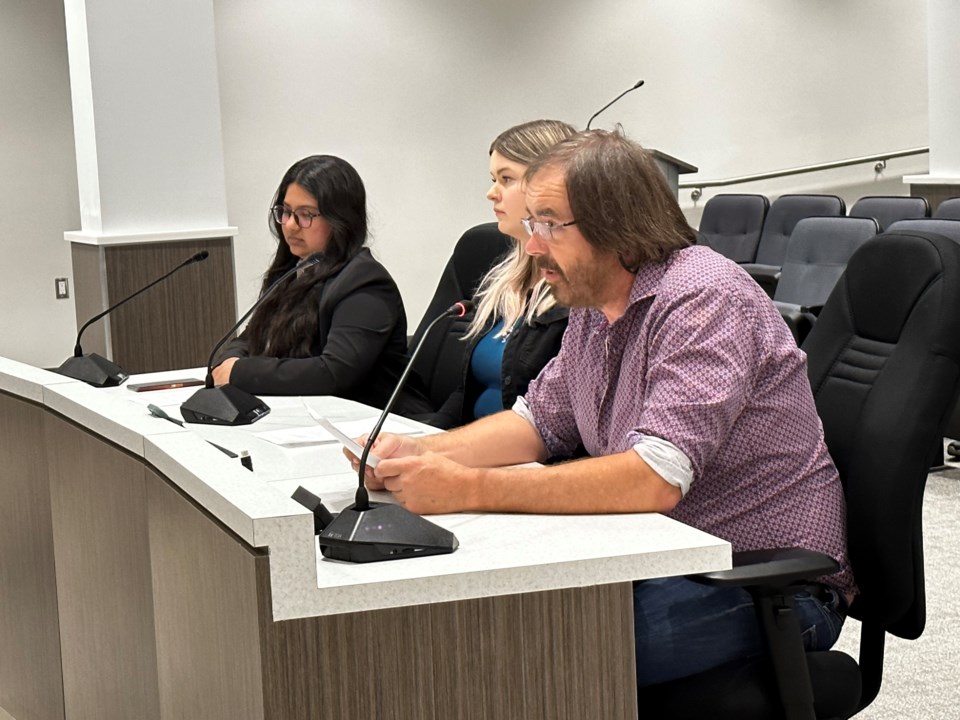As the human toll of the opioid crisis continues to mount, three Georgian College students are advocating for a compassionate approach to those living with substance use disorders.
That message is part of the 'Addiction is not a choice' campaign put together by addictions treatment and prevention students Mike Barrington, Prankti Pramthesh Pandya, and Taylor Rice, which they presented to Orillia council on Monday.
“Perhaps like myself, you grew up with the idea that addicts … made bad choices, had no willpower, were morally weak, or a combination of these. That's the perception that I grew up with,” Barrington said.
“We now have so much more information and research available that shows the links between early childhood trauma, negative environments and negative exposures," Barrington said. "Substance use disorder is almost purely a creation of the circumstances of a person's life largely beyond their control.”
According to the presentation, 95 per cent of people with mental health or substance use disorders have experienced stigma, in its various forms, in the past five years, whether from self stigma, social stigma, or structural stigma — when healthcare providers do not take the needs of those suffering seriously.
Opioid deaths in the Simcoe-Muskoka region and beyond skyrocketed through the COVID-19 pandemic, with stigma and a lack of education surrounding addiction playing a contributing factor in these inflated figures, the students said.
“If we can help people access treatment and medical care, we can save lives and lower the pressure on all of our services. Stigma is the barrier that prevents people from reaching out or prevents them from getting the best possible care when they do,” Barrington said. “This is the lynchpin where good public education can really make a difference.”
The students noted 111 confirmed and likely opioid-related deaths took place in Simcoe-Muskoka in the first 10 months of 2022, a 21 per cent drop from the 151 deaths over the same span in 2021, but those numbers are still much higher than they were pre-pandemic, the students said.
An additional hope for the campaign is to encourage people to act compassionately toward those living with addictions, and to use neutral language when discussing substance use disorders.
“The main takeaway that we hope people will get from the campaign is to be kind to people, use words that are in neutral language, have compassion,” said Pandya.
“Empathy matters a lot when someone is recovering from addiction, and reducing stigma, showing compassion, and neutral language is something that we hope people can take away from this campaign.”
Beyond encouraging connection and understanding, the group hopes to educate people about the signs and symptoms of addiction.
“A lot of people that we've observed, even while we're studying, and now that we're doing our internships, they don't know the difference between drug overdoses as well as identifying that there's been an overdose,” Pandya said.
Pandya also highlighted that everyone loses when people suffer with addictions or die from overdoses, including family, friends, the community, and also the strained healthcare system.
“The person who has had an overdose, they're someone's daughter, or someone's mother or father, or they’re somebody's son — everyone is loved,” she said.
“Everyone around them suffers as well. Orillia is losing manpower … hospitals are getting backlogged, resulting in long hours to get consultation," said Pandya.
“When you educate people with compassion and neutral language, people will be more open to seeking support.”
Following the presentation, city politicians thanked the students for their work to help address stigma and educate the public about substance use disorders.
“I want to thank Georgian College and thank the students and all the faculty involved, and just remind all of us that this campaign grew out of a council working group, and we passed a motion to develop a public awareness and education campaign, with a focus on reducing stigma and building support for a community drop-in centre and a community hub,” said Coun. Janet-Lynne Durnford. “We are continuing to meet as a working group to address that need.”
Coun. Ralph Cipolla questioned what steps the group will take to begin educating the public on the consequences of opioids — which he views as a “key factor” in preventing the crisis from escalating.
“The opioid epidemic in itself can't be addressed as a singular feature. One of the things that we really wish to make clear is that the opioid epidemic is the tip of the iceberg,” Barrington said.
“It's the people who are suffering the most from various other conditions that resort to these drugs and other behaviours in order to alleviate their symptoms, so it's about being compassionate with them when they're under those circumstances and offering them other choices," he explained.
Barrington said he hopes to see the city step up and help forward the campaign, as well.
“This is our campaign, but we've created this with an effort to pass it on to you, as councillors and as the city, for you to take it from there,” he said. “We're hoping that you’ll take the torch up and use it in the best way that you can.”
Orillia Mayor Don McIsaac questioned whether the group supported measures like safe injection sites, and Barrington highlighted that research indicates such sites can be quite helpful, but also controversial.
“Injection sites and harm reduction sites can be politically controversial. There can be backlash, and part of that is public education,” Barrington said.
“There's political backlash around that topic, but I think we're willing to bear that burden. I mean, people are dying,” the mayor replied. “If people had a safe place to get a needle, test their stuff, have a safe place to inject, I think that's important. You're not going to change that behaviour right away, so there's a series of things that have to be done, (and) I think that's certainly one of them.”
